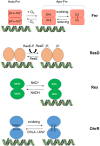Adaptation in Bacillus cereus: From Stress to Disease
- PMID: 27757102
- PMCID: PMC5047918
- DOI: 10.3389/fmicb.2016.01550
Adaptation in Bacillus cereus: From Stress to Disease
Abstract
Bacillus cereus is a food-borne pathogen that causes diarrheal disease in humans. After ingestion, B. cereus experiences in the human gastro-intestinal tract abiotic physical variables encountered in food, such as acidic pH in the stomach and changing oxygen conditions in the human intestine. B. cereus responds to environmental changing conditions (stress) by reversibly adjusting its physiology to maximize resource utilization while maintaining structural and genetic integrity by repairing and minimizing damage to cellular infrastructure. As reviewed in this article, B. cereus adapts to acidic pH and changing oxygen conditions through diverse regulatory mechanisms and then exploits its metabolic flexibility to grow and produce enterotoxins. We then focus on the intricate link between metabolism, redox homeostasis, and enterotoxins, which are recognized as important contributors of food-borne disease.
Keywords: Bacillus cereus; acidic pH; metabolism; oxygen sensing; redox homeostasis.
Figures




References
-
- Alvarez-Ordonez A., Fernandez A., Bernardo A., Lopez M. (2010a). Acid adaptation sensitizes Salmonella enterica serovar Typhimurium to osmotic and oxidative stresses. Arch. Lebensmittelhyg. 61 148–152. 10.2376/0003-925X-61-148 - DOI
Publication types
LinkOut - more resources
Full Text Sources
Other Literature Sources
Molecular Biology Databases
Research Materials

